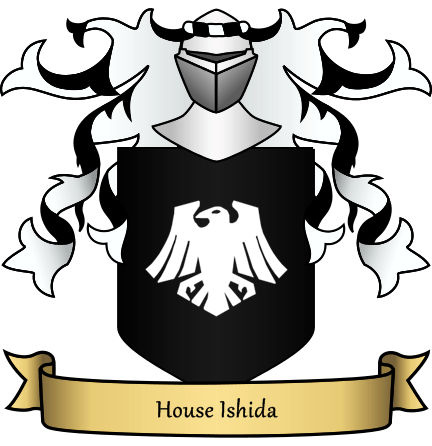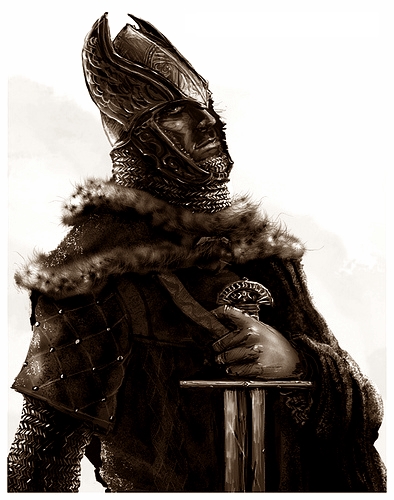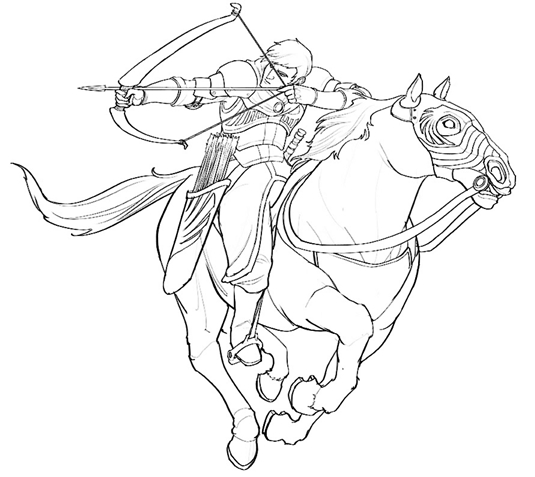Difference between revisions of "Ishida Family"
m (→Mixed Infantry) |
|||
| Line 85: | Line 85: | ||
Linesmen make up the majority of the Guard's rank-and-file. The average linesman is equipped with a round shield, axe or (more rarely) short sword, and several javelins. They are usually armoured in leather or chain mail, depending on the resources available to their commander. | Linesmen make up the majority of the Guard's rank-and-file. The average linesman is equipped with a round shield, axe or (more rarely) short sword, and several javelins. They are usually armoured in leather or chain mail, depending on the resources available to their commander. | ||
| − | In battle the | + | In battle the linesmen are called to do exactly as their name suggests; hold the line. Discipline and cohesion are core tenets of the linesmen cohorts, and reckless bravery is touted as foolish in the face of organised formations. Linesmen tactics commonly involve forming a shield wall with the front ranks while their comrades in the rear fling javelins to whittle down the enemy before the inevitable crash of melee. |
| − | |||
==== Infantry ==== | ==== Infantry ==== | ||
Revision as of 16:04, 6 October 2013
Contents
House Ishida
Origins
The origins of House Ishida are lost to time, but tradition holds that they are descended from a line of Far Eastern nobles who migrated from their homeland generations ago. The main branch of the family has since settled in Atamara.
Present Day
Under the leadership of Mizuhiro the Ishida managed to elevate themselves into prominence. Originally from Sauvia, during the Great Atamaran War Mizuhiro saw fit to relocate the family home and its heirlooms to Craigmore.
The Ishida are fair skinned, with characteristically black hair. Though records suggest that their ancestors possessed oriental looks, the average contemporary Ishida would not look out of place among the nobility of Atamara.
Heraldry
Heraldic device of House Ishida
The heraldic emblem of House Ishida is a stylised raven with outstretched wings. It is often featured as an argent charge upon a sable field.
The Raven is seen as a creature of cunning and intellect, both of which are qualities prized by the Ishida. The Raven is a common sight on the battlefield, a reminder to Ishida nobles that there is much opportunity in war.
The primary colour of House Ishida is black, or sable. This is found most commonly on the cloaks donned by those who serve the House.
Residence
House Ishida's seat is the Ravenholme, an imposing tower built of smooth black rock. Exceedingly lofty in comparison to the structures around it, the Ravenholme is both a fortification and a residence. Barrack spaces and living quarters have been hewn into the walls of the lower levels, ready to house the Ishida's troops as well as provide guest facilities for visiting nobles.
The Ishida themselves occupy the upper floors. Compared to the homes of many noble families, the Ravenholme's interiors possess a slightly darker ambience. Wall-mounted candles provide a measure of light, as many of the lower hallways and rooms have little more than arrow-slits for windows. Furs are a common item, both as decoration and for warmth.
The Ravenguard
A Centurion of the Raven Guard
House Ishida maintains a standing force known as the Ravenguard. The Ravenguard is structured into units known as Centuria, each led by a noble commander.
Ravenguard Hierarchy
Below the nobles are the Centurions, the Guard equivalent of a Captain. Centurions are hand-picked from the ranks for exceptional leadership and courage in battle.
In times of peace Centurions receive schooling in tactics and philosophy. Such education is costly and difficult to obtain outside of the nobility, and so the rank of Centurion is one that is very much sought after by the common soldiery.
Centuria contain smaller, squad-sized groupings known as Talons. A Talon is a squad of 8 to 10 men lead by a Decanus, usually the longest serving man in the Talon. The Decanus upholds discipline and promotes camaraderie among his men.
Ravenguard Troops
I Centuria
The First Century forms the elite of the Ravenguard and is always designated to the current leader or heir of the House, though he or she may not opt to command them.
They are the cream of the Ravenguard crop, deployed as heavy cavalry. Each is armoured with a black composite suit of scale and plate, granting protection without sacrificing too much mobility. Winged helms and visors hide their faces from view. A hooded cloak of deep crimson (the colour signifying their elite status) completes the outfit, secured with a clasp bearing the insignia of the Ravenguard.
In battle the I Centuria rides the charge on barded black destriers. Each man carries a pair of matched ceremonial blades, usable while on horseback, though the I Centuria will also commonly wield spears during the initial charge. A code of honour binds them to silence while they don their masks, forcing the I Centuria to communicate commands in battle via hand gestures.
A Centurion of the First Century receives the title of Huntmaster (or Huntmistress if female) in recognition of the prestige that comes from captaining the best forces that House Ishida can field.
Mixed Infantry
Linesmen make up the majority of the Guard's rank-and-file. The average linesman is equipped with a round shield, axe or (more rarely) short sword, and several javelins. They are usually armoured in leather or chain mail, depending on the resources available to their commander.
In battle the linesmen are called to do exactly as their name suggests; hold the line. Discipline and cohesion are core tenets of the linesmen cohorts, and reckless bravery is touted as foolish in the face of organised formations. Linesmen tactics commonly involve forming a shield wall with the front ranks while their comrades in the rear fling javelins to whittle down the enemy before the inevitable crash of melee.
Infantry
The shieldbearers are a corps of men who disdain ranged warfare, preferring instead to rely on stoutness of body and heart to weather all threats. Their trademarks are the large oval shields that they carry into battle, capable of covering a man from chin to shin. Usually armoured in chain mail or better, the more cumbersome nature of their attire leads most shieldbearers to opt for a stabbing sword or short spear in battle.
Shieldbearer cohorts are known for their doggedness and tenacity. They take much pride in forming a fortress of armoured men, a stout barrier of wood and steel to reinforce the battle line.
The Ravensworn
There are many in the Guard who aspire to serve in the First Century, not a difficult thing to understand given the associated benefits that come from being an elite force. Naturally, applicants must undertake a stringent training regime and succeed in a number of tests before they can be counted among the best of the Guard.
Many fail at some point or other, and those who wish to submit their names for another try are allowed to do so on one condition; they must serve for two years with the Ravensworn.
The Ravensworn operate as a tactically flexible light cavalry force, trained primarily for extended sorties and scouting missions, but also to act as mounted skirmishers in battle when needed. Lightly armoured, they are equipped with swords and short bows to take advantage of their greater mobility.
As failed applicants seeking reconsideration the Ravensworn are usually called upon for demanding military assignments far from home. These men ride into battles with fervour, hoping to distinguish themselves in the eyes of their commander.
The Crowsworn
The term Crowsworn can be applied to any military personnel in service with the Ishida, but not officially sworn to service within the Ravenguard. This often includes the troops of Ishida nobles who do not live on Atamara, where the main branch of the House can be found.
Crowsworn are considered inferior to Ravenguard or even Ravensworn, lacking many of the traditions and values held closely by the Ishida. Most Crowsworn are often professional soldiers or hired swords from whichever realm the noble resides in. Unlike the sable-clad Ravenguard, the Crowsworn wear cream coloured cloaks emblazoned with a black Ishida raven.
Crowsworn Troops and Hierarchy
Crowsworn infantry are usually organised into the same unit types as the Ravenguard. There is naturally no I Centuria equivalent in the Crowsworn. Crowsworn horsemen are often equipped with light lances and shields as they lack the high quality swordsmanship of the Ravenguard heavy cavalry.
Crowsworn officers may be called Centurions, though the rank has little authority beyond command of the unit.
Notable Members
- Mizuhiro Ishida, Atamara, Cagilan Empire
- Tetsuko Ishida, Atamara, Talerium (Hiatus)
- Himeko Ishida, Beluaterra, Thalmarkin
- Isamu Ishida, Atamara, Cagilan Empire
- The Silent Ishida, Dwilight, Swordfell


